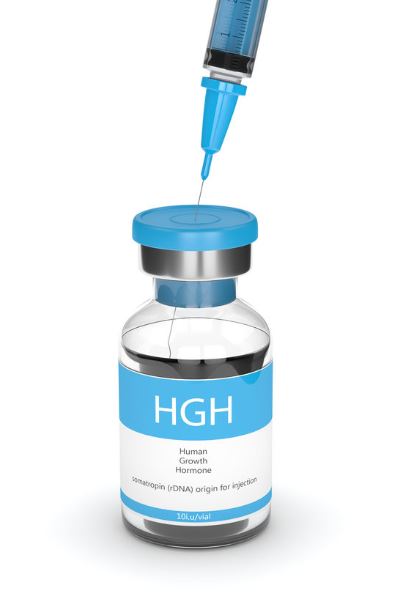Growth hormone (HGH) or somatotropin is a peptide hormone released from the anterior pituitary glands. Its main functions include regulation of growth in children and adolescents, helping them reach their adult height, and tissue repair and cell regeneration in all age groups.

Deficiency of Growth hormone in children can result in short stature, delayed maturation, and loss of muscle mass. Short height becomes noticeable around 3 years of age when the child doesn’t have any increase in height. Growth hormone is an important hormone for the metabolism and the development of the human body.
Related: Is HGH the Fountain of Youth That We All Have Been Looking For
However, throughout life, Growth hormone levels decline, resulting in several changes that are seen as the signs of aging. In fact, there is a 14-15% decrease in growth hormone per decade from the age of 20-30 years. At the age of 60years, growth hormone levels are half than what they used to be.
Growth hormone has been known to increase bone density and the lean muscle mass of the elderly. There is much literature that recommends growth hormone therapy in the elderly to increase muscle mass, skin thickness, and decrease body fat. However, new research has found other uses of it that may revolutionize GH use.
New Study claims Growth hormone helps in tissue healing
Tissue damage is a topic for research since healing of the damaged tissue depends on many factors, any of which can be manipulated to speed up the process in the human body. Recent studies have shown that a gene encoding for proteins that are in the FOX transcription factors family called Foxm1b plays a vital role in the tissue repair process.
What is the Foxm1b gene?
Foxm1b is a gene encoding for the Fox M1 protein that is a transcriptional activator, usually upregulated in cancers. It also is involved in the entire life cycle of the cell, making it useful in the tissue repair mechanism.
Related: Genf20 Plus Review – Benefits Side Effects And Testimonials
In previous studies, researchers had focused on the Foxm1b gene and its effect on tissue regeneration. The study was performed on a group of old mice with parts of their liver removed, as the liver is the only organ that can completely regenerate. Foxm1b gene was introduced into the mice and they found that the proteins produced by the gene resulted in tissue regeneration at the speed of it in young mice.
However, in the new study conducted by Robert Costa, professor of biochemistry and molecular genetics at the University of Illinois at Chicago and his team, they aimed at the action of GH on this gene.
Related: Growth Factor Plus
Researchers studied two groups of old-aged mice, both groups missing parts of their liver. However, researchers only injected growth hormones into one group of aged mice. This group showed high activity of the Foxm1b gene and complete regeneration took place in two days. Whereas the group of mice that did not receive the growth hormone injections took almost a month for complete regeneration of the liver.
Related: HGH Supplements Versus HGH Injections: Which Should You Use?
To study more about growth hormone and Foxm1b interaction, Costa and his team then studied a group of mice that had the Foxm1b gene removed from their genome. They found that Growth hormone injections in these mice were of no use and brought about no change.
Hence concluding that the Foxm1b gene is important for the effect of growth hormone. However, the lead author of the study refused to conclusively recommend GH injections for tissue repair. According to him, the study was performed short term and the long term consequences of the injections are yet not known. More studies need to be performed before a conclusive recommendation can be made.
Related: Study Finds That HGH Abuse Among Male Bodybuilders Is Widespread
References
Growth Hormone Activates Gene Involved In Healing Damaged Tissue.



